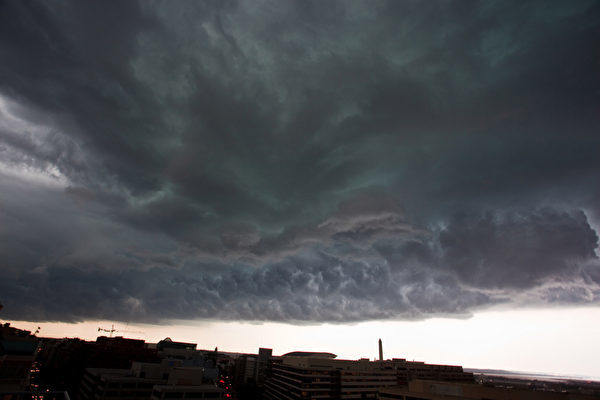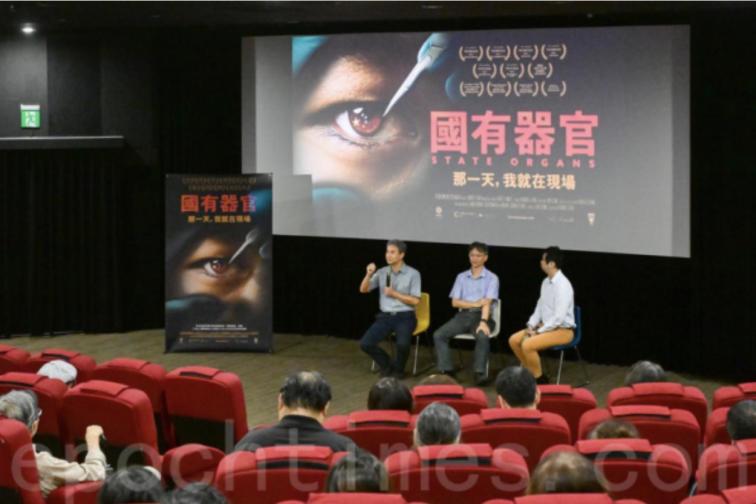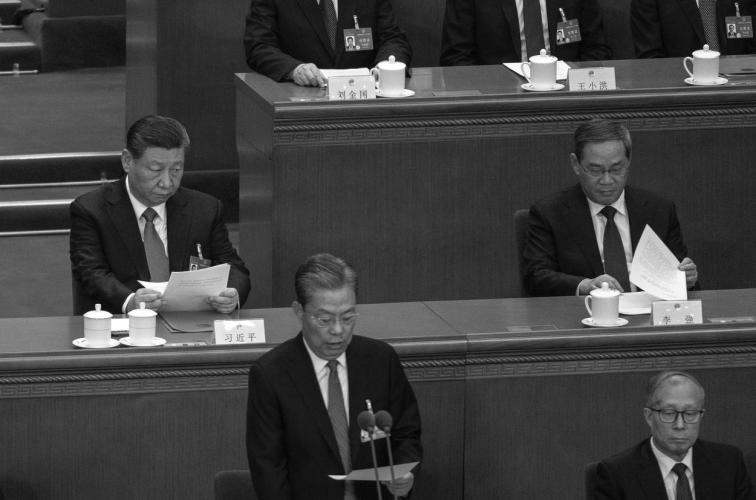The Chinese Communist Party (CCP) is deeply mired in debt, with its money-grabbing efforts continuing unabated. Its collapse may not be far off. (Jeff Nenarella/Dajiyuan)
[People News] The U.S.-China tariff war has entered a white-hot stage. On April 14, China’s State Council Information Office held a press conference where Lv Daliang, spokesperson of the General Administration of Customs and director of the Statistical Analysis Department, said that while China's exports currently face a complex and severe external environment, “the sky won't fall.”
A netizen from mainland China commented: “The sky might not fall, but the raging storm will cause huge damage to the country and its people.” Another added, “The sky won’t fall, but a sky-high disaster has already crashed down.” Previously, the Chinese Communist Party's official newspaper, People’s Daily, published an article titled “The Sky Won’t Fall,” which was mocked online: “The sky hasn’t fallen, but the ground has cracked.” Dissident Wang Yajun appeared in a YouTube video wearing a shirt printed with eight bold characters: “If the sky falls, the people will bear it.”
According to Caixin, Goldman Sachs’ Chief China Economist Shan Hui said at a media briefing on April 11 that if China exported “not a single penny” worth of goods to the U.S., and all manufacturing investments tied to exports to the U.S. ceased, China’s GDP would drop by 3 percentage points. Goldman Sachs estimates that between 10 and 20 million Chinese jobs are directly or indirectly tied to exports to the U.S.
The U.S.-China tariff war is nothing short of an apocalypse for China’s foreign trade sector and the people who rely on it. On April 14, the General Administration of Customs announced that, in U.S. dollar terms, March imports were down 4.3% year-over-year, while exports were up 12.4%, with a trade surplus of $102.64 billion. March may have been the final frenzy of Chinese exports—since Trump’s election, the Chinese government has been rushing to ship orders before the tariff “nuclear bomb” detonated. Back then, outsiders estimated that the tariff cap would be around 60%. Today, it has reached 145%, thanks to Xi Jinping’s hardline stance, determined to keep playing the tough guy with the U.S., even if the whole country has to live on grass and tree bark. Truly living up to the science rogue, He Zuoxiu’s infamous quote: “It’s your misfortune to be born in China!”
Look at how ordinary people on the ground are feeling the direct impact of the tariff war. A female garment worker in Shaoxing complained: “These tariffs are killing us. All the bosses in Shaoxing are breaking down. If you sell goods worth 100 yuan, you first have to pay 145 yuan just to get them through U.S. customs. Now we can't even give our inventory away as rags.” A small business owner in Yiwu lamented, “With 104% tariffs, how can we foreign trade folks in Yiwu survive? Business has already been sluggish for two or three years.” A female accountant at a cross-border e-commerce company said, “It feels like the sky really is falling. I’ve only worked here for a little over a year, and now I have to look for another job. Over 70% of our sales come from the U.S., and our boss hasn’t shown up for over half a month. I left my last job because the company stopped paying salaries, and now I’m afraid it’s happening again.” A woman working in packaging exports said, “We can’t ship our inventory at all. I have to pay 30,000 yuan in mortgage and car payments on the 15th and 17th of this month. I can’t even sleep at night. No one knows when this tariff war will end. It’s us ordinary folks who are hit the hardest.” A male video blogger admitted, “China accounts for 80% of the global plush toy market, and 43% of those are sold to the U.S. We used to flood the world with cheap products. Now, with these tariffs, whole toy factories are going to disappear.”
On mainland Chinese social media platforms like Douyin and Xiaohongshu, countless small business owners and workers are lamenting their predicaments and crises. The helplessness and despair in their eyes is heartbreaking. Meanwhile, the Chinese Communist Party’s official media outlets “write only of peace and prosperity, unwilling to bow their heads to the common people.” Whether in print or video, official narratives blast the trumpet of struggle, painting a picture of a brilliant economy, vowing to fight the U.S. to the bitter end.
Under the 145% tariff hammer, many of China’s “world factory” industries have been devastated. For example, the textile and apparel sector: the U.S. is China’s largest export destination for textiles and apparel. According to the China Chamber of Commerce for Import and Export of Textiles, in 2024, China’s textile and apparel exports totaled $301.13 billion, with $50.96 billion going to the U.S.—16.9% of the total. A clothing supplier in Guangzhou told Jiemian News that U.S. orders had already been declining since early 2024, with prices also dropping. In Panyu’s Nan Village in Guangzhou—one of the local clothing manufacturing hubs—around 40-50% of the factories have shut down over the past two years due to a lack of business. Now, with the new tariffs, it’s virtually a complete shutdown.
China’s auto parts exports are also heavily reliant on the U.S. According to data from the General Administration of Customs, in 2024, China’s exports of auto parts to the United States amounted to 99.77 billion yuan, accounting for 15% of total auto parts exports. In addition, according to The Wall Street Journal, more than 40% of auto parts used by American car manufacturers are imported from Mexico, many of which come from Chinese-owned factories. Most Chinese auto parts companies operating overseas have net profit margins under 15%. If Trump imposes a 25% tariff on steel, aluminum, and auto parts, Chinese auto parts firms will be left out in the cold.
Moreover, the U.S. is the number one export destination for Chinese lithium batteries. According to an analysis by Dongxing Securities, in 2024, China’s exports of power and energy storage batteries reached 197.1 GWh, a year-over-year increase of 29.2%. Power batteries accounted for 68%, while energy storage batteries made up 32%. Exports to the U.S. represented 25% of total power battery exports ($15.32 billion) and 23% of energy storage battery exports ($2.03 billion). In 2024, China’s exports of energy storage batteries to the U.S. totaled $6.27 billion, accounting for 57% of U.S. imports, equivalent to approximately 35–40 GWh of demand. With tariffs added, the duty on Chinese lithium batteries exported to the U.S. has reached a peak, and the resulting price surge is expected to significantly dampen market demand.
Another sector hit hard by Trump’s tariffs is the photovoltaic (PV) industry. The U.S. is the second-largest solar market in the world. According to the Solar Energy Industries Association (SEIA), in 2024, U.S. solar installations reached approximately 50 GW (DC), a 21% increase year-on-year. The U.S. had already established trade barriers against the dumping of Chinese solar products prior to this round of tariffs. Chinese PV companies had been shifting large portions of their production to Southeast Asia to avoid these restrictions. However, in 2024, the U.S. launched anti-dumping and countervailing duty (AD/CVD) investigations on solar products from Malaysia, Vietnam, Cambodia, and Thailand, leaving many Chinese production lines at a standstill. As a result, some Chinese PV production capacity has begun shifting to Indonesia and Laos, while some companies are testing the waters in the Middle East, building factories in Saudi Arabia, Oman, Turkey, and other countries. With Trump’s globally enforced reciprocal tariffs now in place, it will be extremely difficult for the Chinese PV industry to slip through the cracks.
Perhaps the hardest hit are cross-border e-commerce platforms like Shein and Temu. On February 4, the Trump administration announced the repeal of the “de minimis” exemption policy for low-value parcels. Within five days of the change, starting February 5, Shein’s U.S. sales fell by 16% to 41%. Then on April 8, the U.S. announced that tariffs on low-value, duty-free parcels would increase to 90% of the package’s value, or raise the flat fee from $75 to $150. The new tariffs will take effect on May 2, and the higher flat fee will be implemented after June 1. This is a potentially devastating blow to both Shein and Temu.
China’s economy was already teetering, and with the weight of crushing tariffs bearing down like Mount Tai, it is inevitable that the Chinese economy will plunge into a deep abyss in 2025. Nevertheless, Xi Jinping continues to proclaim, “China’s economy is a vast ocean, not a small pond. Tempests can overturn a small pond, but they cannot overturn a vast ocean.” But such hollow, Cultural Revolution-style slogans about battling the heavens and the earth—can they really revive China’s collapsing economy?
As one blogger sarcastically put it, whether the economy lives or dies doesn’t really matter. What’s important is that the 1.4 billion Chinese people form an iron wall, nibble on bark, eat Guanyin clay, chew on roots, and after grinding through three to five years, we’ll have won again!
(Originally published by People News)







News magazine bootstrap themes!
I like this themes, fast loading and look profesional
Thank you Carlos!
You're welcome!
Please support me with give positive rating!
Yes Sure!